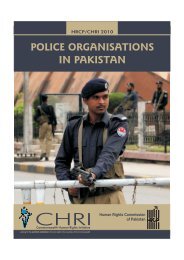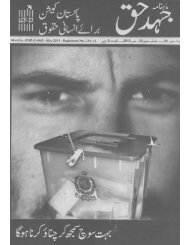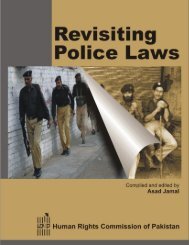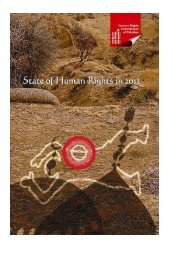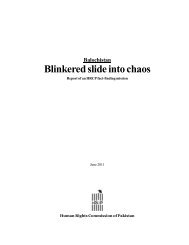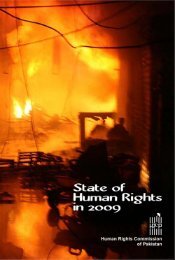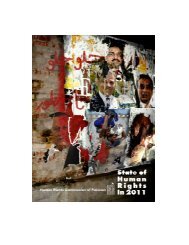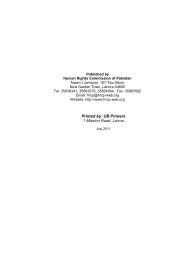Download PDF file - HRCP
Download PDF file - HRCP
Download PDF file - HRCP
Create successful ePaper yourself
Turn your PDF publications into a flip-book with our unique Google optimized e-Paper software.
<strong>HRCP</strong> fact-finding missions’ report 19<br />
have failed to take serious notice of torture and accept it as a common reality.<br />
The Constitution of Pakistan does not give absolute protection against torture. Article 14 guarantees<br />
“the dignity of man” and it is followed by a sub-article stating:<br />
“No person shall be subject to torture for the purposes of extracting evidence.”<br />
There can be no derogation from the right not to be tortured even in times of emergency, conflict or<br />
external war. <strong>HRCP</strong> is of the view that the constitutional guarantee against torture should be unqualified.<br />
Pakistan’s law enforcement and decision makers must be acquainted with the provisions of the United Nations<br />
Code of Conduct for Law Enforcement Officials. Article 5 of the Code states:<br />
“No law enforcement official may inflict, instigate or tolerate any act of torture<br />
or other cruel, inhuman or degrading treatment or punishment, nor may any law<br />
enforcement official invoke superior order or exceptional circumstances such as state of<br />
war or a threat of war, a threat to National Security, internal political instability or any<br />
other public emergency as a justification of torture or other cruel, inhuman or degrading<br />
treatment or punishment.”<br />
The government of Pakistan should sign to the UN International Covenant on Civil and Political Rights<br />
and its Optional Protocol. In particular, the Convention against Torture and Other Cruel, Inhuman or Degrading<br />
Treatment or Punishment must be signed and ratified.<br />
<strong>HRCP</strong> must emphasize that the reports regarding allegations of torture received by them are the tip of<br />
the iceberg. Amongst the reports which cannot be reported are those which do not sound credible or are not<br />
verified or consistent. In addition to this, a number of victims and their families do not wish to be identified.<br />
Allegations of torture<br />
♦<br />
Seven members of Balochistan Students’ Organization (BSO) were arrested between the<br />
night of 24 th and 25 th March, 2005, from Karachi, after attending a peaceful rally protesting<br />
against the army operation in Balochistan. Amongst them were Dr Imdad Baloch, Dr Yousaf<br />
Baloch, Dr Naseem Baloch, Ghulam Rasool, Dr. Allah Nazar, Akhtar Nadeem and Ali Nawaz..<br />
Dr Yousaf Baloch, Dr Naseem Baloch, Ghulam Rasool and Dr Imdad Baloch were produced<br />
in police station Sakhi Sarwar in Dera Ghazi Khan after having been kept in illegal confinement<br />
and tortured by intelligence agencies. They were released on 24 th May. Dr Allah Nazar was<br />
eventually produced in a court in Rahimyar Khan on 13 th August. He was then shifted to<br />
Balochistan and charged for terrorist acts. He is currently at Central Jail Quetta. He is virtually<br />
paralysed and has lost a substantial part of his memory. <strong>HRCP</strong> vice chairperson Mr Zahoor<br />
Ahmed Shawani met Dr Allah Nazar, who reiterated he had suffered torture and as a<br />
consequently is physically and mentally impaired.<br />
♦ Akhtar Nadeem, son of Lai Bakhsh, and Ali Nawaz were released on November 2 nd , 2005.<br />
They had been kept in anti-terrorist sub-jail at Quetta. Both have given detailed accounts of<br />
torture. [See Appendix ‘B’ for a detailed account by Dr. Imdad Baloch].<br />
♦<br />
Alam Pirkani Baloch, belonging to the Pirkani tribe, was arrested by the CIA on September<br />
24 th , 2000, in Jehaniah, Multan District, Punjab province. He was arrested by DSP Sheryar



